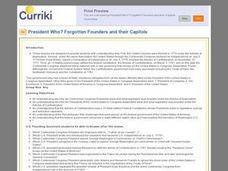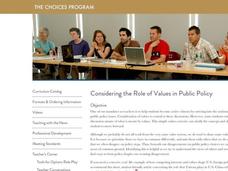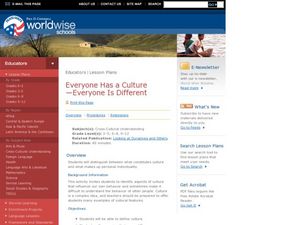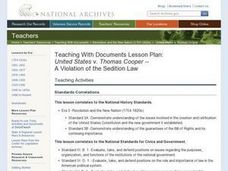Curated OER
Presidents and the Constitution: Washington, Adams, Jefferson, Madison and the Barbary Pirates
High schoolers explore the Barbary Pirates of the Mediterranean. In this American history lesson, students read a narrative regarding the conflict between the Barbary Pirates and the United States under the leadership of Washington,...
Curated OER
Landmark Supreme Court Cases and the Constitution: Reynolds v. United States (1878)
Students examine the impact of court decisions. In this Supreme Court instructional activity, students read the Reynolds v. United States (1878) case study regarding first election decided by the House of Representatives. Students...
Curated OER
Michigan Constitution and the Legislative Branch
Students explore online resources to compare and contrast the different constitutions the state of Michigan has had. They continue their exploration of various websites, focusing on the legistlative branch and the homepage of their local...
Curated OER
The U.S. Constitution: Practical Application of the Amendments
Students create their own HyperStudio cards which include scanned images of at least one member (designated reader) of each group. They add the text of a predetermined amendment. The designated reader then reads the selected amendment.
Curated OER
Bill of Rights
US history classes explore constitutional rights as they relate to court cases involving teens. Your class must already be familiar with the Bill of Rights before beginning this series of exercises. In preparation for a debate-style...
Curated OER
Defending the Homeland--The Alien and Sedition Acts of 1789
Students explore that there have been times during the history of the US when ,in response to real and perceived threats, both domestic and foreign, our country has responded by passing legislation. Students trace the fundamental rights...
Curated OER
Expansion and Reform: Applying the Declaration of Independence
Students conduct inquiries and research-acquiring, organizing, analyzing, interpreting, evaluating, and communicating facts, themes, and general principles operating in American history. They use the Declaration of Independence to...
Curated OER
President Who? Forgotten Founders and Their Capitols
Students explore the beginning of the United Colonies that were formed in 1774. In this history lesson, students discuss the Articles of Confederation and then answer questions about the events surrounding the development of the colonies.
Curated OER
Founding Myths, Stories that Hide Our Patriotic Past
Learners participate in a scavenger hunt using their textbooks to find information about historical events, people and places in US history during the Revolutionary Era. After creating their list of important people, students create...
Curated OER
The Branches of Government
After reviewing and reading about the three branches of US Government, complete this activity with your class. In groups, they will place their "cards" on the board under the correct branch. This lesson is weak and unclear. I'd make a...
Curated OER
Researching American Democracy
Students compare Watergate and the Clinton/Lewinsky scandal. In this U.S. Constitution lesson, students define vocabulary terms and read articles regarding the impeachment process. Students respond to questions that require them to...
Curated OER
Frederick Douglas
Fourth graders explore the African Americans resistance to slavery. For this US History lesson, 4th graders read excerpts of a speech by Frederick Douglas.Students develop a position of right or wrong to certain situations within their...
Constitutional Rights Foundation
Refugees from the Caribbean: Cuban and Haitian “Boat People”
Should refugees fleeing poverty be allowed the same entrance into the United States as those fleeing persecution? High schoolers read about US foreign policy in the late 20th century regarding refugees from Cuba and Haiti, and engage in...
Curated OER
Choosing a College
How can mathematics help scholars choose a college? High schoolers learn how they can use decision matrices to rank colleges based on selected criteria. They also see how to weigh criteria using multiplication of the decision matrix by a...
Bill of Rights Institute
Freedom for All?
What did abolitionists have in common with those working for women's rights? How has the Native American struggle for voting rights differed from the struggles of other groups? Class members examine the 15th, 19th, 23rd, 24th, and 26th...
Curated OER
Discovering American Symbols
Help youngsters get to know their states and capitals, explore their own country, and study American symbolism. They take a "trip" across America collecting symbols, images, and information about each state as they go (through text and...
Brown University
Considering the Role of Values in Public Policy
Strong opinions come from deeply held values. Young citizens explore the values that are most important to them in a class discussion and activity. As they prioritize a list of values cards that include freedom, justice, and democracy,...
Curated OER
Judges in the Classroom
Students examine the classification categories of rights including liberty, security, cultural, and group rights. They identify and analyze the various similarities and differences among five countries and their constitutions.
Curated OER
Everyone has a Culture-Everyone is Different
Young scholars explore cultural features. In this multicultural acceptance lesson, students define and discuss "culture," and distinguish the difference between individual characteristics and cultural characteristics. Young scholars...
Curated OER
United States v. Thomas Cooper --
Students compare the Alien and Sedition Act to the First Amendment. They read and analyze a primary document and write a synopsis. They brainstorm challenges to the Government or President of the US.
Curated OER
The Jury System
Students analyze Article III and the Seventh Amendment. In this US Justice lesson, students research the US jury system and complete a Student Jury questionnaire. Students will discuss the impact the implementation of the Jury System had...
Curated OER
Limits of Power
Middle schoolers examine the importance of limiting power in governments. In this government instructional activity, students investigate the importance of placing limits on government by looking at the US Constitution. They look at ways...
Curated OER
Civil War and Reconstruction
Fourth graders investigate the Civil War by researching the state of Virginia. In this US History lesson, 4th graders identify Abraham Lincoln, James Chestnut and Fort Sumter, and discuss their roles in the start of the Civil War. ...
Curated OER
Fighting for Democracy, Fighting for Me
Ninth graders investigate specific individuals involved in Operation Iraqi Freedom and working backward to stories from World War II. In this US History lesson, 9th graders read documents that depict the conflicts faced by individuals...

























